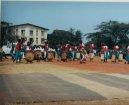Burundi
Burundi: Travel tips, articles, photos, gallery, cities database, population, pics, flags, statistics, free maps online
Back to Countries, Click to read the whole article: Burundi
| Introduction - Burundi: | | Location - Burundi: | | People - Burundi: | | Government - Burundi: | Country name | conventional long form: Republic of Burundi
conventional short form: Burundi
local long form: Republique du Burundi/Republika yu Burundi
local short form: Burundi
former: Urundi | | Government type | republic | | Capital | name: Bujumbura
geographic coordinates: 3 22 S, 29 21 E
time difference: UTC+2 (7 hours ahead of Washington, DC during Standard Time) | | Administrative divisions | 17 provinces; Bubanza, Bujumbura Mairie, Bujumbura Rurale, Bururi, Cankuzo, Cibitoke, Gitega, Karuzi, Kayanza, Kirundo, Makamba, Muramvya, Muyinga, Mwaro, Ngozi, Rutana, Ruyigi | | Independence | 1 July 1962 (from UN trusteeship under Belgian administration) | | National holiday | Independence Day, 1 July (1962) | | Constitution | 28 February 2005; ratified by popular referendum | | Legal system | based on German and Belgian civil codes and customary law; has not accepted compulsory ICJ jurisdiction | | Suffrage | NA years of age; universal (adult) | | Executive branch | chief of state: President Pierre NKURUNZIZA (since 26 August 2005); First Vice President Martin NDUWIMANA - Tutsi (since 29 August 2005); Second Vice President Gabriel NTISEZERANA - Hutu (since 9 February 2007)
head of government: President Pierre NKURUNZIZA (since 26 August 2005); First Vice President Martin NDUWIMANA - Tutsi (since 29 August 2005); Second Vice President Gabriel NTISEZERANA - Hutu (since 9 February 2007)
cabinet: Council of Ministers appointed by president
elections: the president is elected by popular vote to a five-year term (eligible for a second term); note - the constitution adopted in February 2005 permits the post-transition president to be elected by a two-thirds majority of the parliament; vice presidents nominated by the president, endorsed by parliament
election results: Pierre NKURUNZIZA was elected president by the parliament by a vote of 151 to 9; note - the constitution adopted in February 2005 permits the post-transition president to be elected by a two-thirds majority of the legislature | | Legislative branch | bicameral Parliament or Parlement, consists of a National Assembly or Assemblee Nationale (minimum 100 seats, 60% Hutu and 40% Tutsi with at least 30% being women; additional seats appointed by a National Independent Electoral Commission to ensure ethnic representation; members are elected by popular vote to serve five-year terms) and a Senate (54 seats; 34 members elected by indirect vote to serve five-year terms, with remaining seats assigned to ethnic groups and former chiefs of state)
elections: National Assembly - last held 4 July 2005 (next to be held in 2010); Senate - last held 29 July 2005 (next to be held in 2010)
election results: National Assembly - percent of vote by party - CNDD-FDD 58.6%, FRODEBU 21.7%, UPRONA 7.2%, CNDD 4.1%, MRC-Rurenzangemero 2.1%, others 6.2%; seats by party - CNDD-FDD 59, FRODEBU 25, UPRONA 10, CNDD 4, MRC-Rurenzangemero 2; Senate - percent of vote by party - NA%; seats by party - CNDD-FDD 30, FRODEBU 3, CNDD 1 | | Judicial branch | Supreme Court or Cour Supreme; Constitutional Court; Courts of Appeal (there are three in separate locations); Tribunals of First Instance (17 at the province level and 123 small local tribunals) | | Political parties and leaders | governing parties: Burundi Democratic Front or FRODEBU [Leonce NGENDAKUMANA]; National Council for the Defense of Democracy, Front for the Defense of Democracy or CNDD-FDD [Jeremie NGENDAKUMANA]; Unity for National Progress or UPRONA [Aloys RUBUKA]
note: a multiparty system was introduced after 1998, included are: National Council for the Defense of Democracy or CNDD; National Resistance Movement for the Rehabilitation of the Citizen or MRC-Rurenzangemero [Epitace BANYAGANAKANDI]; Party for National Redress or PARENA [Jean-Baptiste BAGAZA] | | Political pressure groups and leaders | none | | International organization participation | ACCT, ACP, AfDB, AU, CEPGL, COMESA, EAC, FAO, G-77, IBRD, ICAO, ICCt, ICRM, IDA, IFAD, IFC, IFRCS, ILO, IMF, Interpol, IOC, IOM (observer), IPU, ISO (subscriber), ITU, ITUC, MIGA, NAM, OIF, OPCW, UN, UNCTAD, UNESCO, UNIDO, UNWTO, UPU, WCO, WHO, WIPO, WMO, WTO | | Diplomatic representation in the us | chief of mission: Ambassador Celestin NIYONGABO
chancery: Suite 212, 2233 Wisconsin Avenue NW, Washington, DC 20007
telephone: [1] (202) 342-2574
FAX: [1] (202) 342-2578 | | Diplomatic representation from the us | chief of mission: Ambassador Patricia Newton MOLLER
embassy: Avenue des Etats-Unis, Bujumbura
mailing address: B. P. 1720, Bujumbura
telephone: [257] 223454
FAX: [257] 222926 | | Flag description | divided by a white diagonal cross into red panels (top and bottom) and green panels (hoist side and fly side) with a white disk superimposed at the center bearing three red six-pointed stars outlined in green arranged in a triangular design (one star above, two stars below) | |
| Economy - Burundi: | | Communications - Burundi: | | Transportation - Burundi: | | Military - Burundi: |
This page was last updated on 16 September, 2007
Source: CIA >>> |




